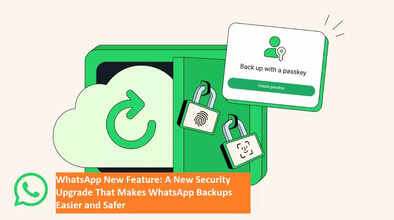WhatsApp New Feature: A New Security Upgrade That Makes WhatsApp Backups Easier and Safer

WhatsApp has introduced a fresh security enhancement designed to make chat backups more reliable and worry-free for millions of users. For many people, WhatsApp is more than just a messaging app—it’s a digital diary filled with years of conversations, photos, videos, voice notes, and personal memories. Losing a phone or switching to a new device often raises a major concern: How do I keep my old chats secure and accessible?
To solve this long-standing issue, WhatsApp has rolled out its new Passkey Encrypted Backup feature. The platform was already the first major private messaging app to adopt end-to-end encryption, ensuring that messages and calls remain strictly between the sender and the recipient. With the introduction of this new system, WhatsApp is strengthening its data protection even further—this time focusing on cloud backups stored on Google Drive or iCloud.
What Is Passkey Encryption and Why It Matters
Until now, users who wanted enhanced protection for their chat backups had to create a separate password or set up a complex 64-digit encryption key. This method was secure but not always user-friendly, especially for those who struggled to remember long codes.
The new Passkey Encryption system removes that hassle entirely. Instead of depending on a manual password, WhatsApp will now use your phone’s own authentication methods—such as:
-
Fingerprint unlock
-
Face recognition
-
Screen lock PIN or pattern
This means your backup security becomes as seamless as unlocking your device. A single tap or face scan is all it takes to protect your chat history.
The biggest advantage is that this passkey system is directly linked to your device’s built-in security mechanism. Even if your phone is lost, stolen, or replaced with a new one, your chats remain protected from unauthorized access. Only you can unlock and restore them using your biometric or device lock credentials.
How the New Passkey System Enhances Backup Safety
WhatsApp’s primary promise has always been privacy. Messages and calls are already safeguarded with end-to-end encryption, preventing anyone—even WhatsApp itself—from accessing your private conversations.
Passkey Encryption extends that same level of protection to your cloud backups. Since these backups are stored externally on Google Drive or iCloud, they can be more vulnerable than chats stored locally on your device. This new system ensures they receive the same high-grade encryption as personal messages.
With passkeys, encryption becomes:
-
Automatic – No more remembering passwords or storing long numeric keys.
-
Stronger – Biometrics are harder to compromise than manually created passwords.
-
Faster – Restoring chats during device changes becomes more convenient.
-
More secure – Hackers cannot retrieve passwords because they no longer exist.
How to Enable WhatsApp Passkey Backup (Available Soon)
WhatsApp has confirmed that the feature is rolling out gradually and will be available to all users in the coming weeks. Once it appears on your device, activating it will be simple. Here’s how you’ll be able to enable it:
-
Open WhatsApp on your phone.
-
Tap the three-dot menu (⋮) at the bottom right.
-
Go to Settings.
-
Select Chats.
-
Tap Chat Backup.
-
Choose the option labeled End-to-End Encrypted Backup.
-
WhatsApp will prompt you to secure your backup using your preferred method—fingerprint, face unlock, or screen lock code.
Once the setup is complete, your chat backups will automatically be protected using your device’s passkey.
A Step Toward a More Private Messaging Experience
With this new upgrade, WhatsApp continues to strengthen its position as a privacy-focused communication platform. By removing the need to remember passwords and shifting to biometric-based encryption, the app offers users a more convenient and highly secure way to preserve their digital memories.
This move not only enhances user confidence but also reflects the growing need for stronger data protection in an increasingly mobile and cloud-dependent world.
If you want any modifications, a bilingual version, or an SEO-optimized meta description, just let me know!

